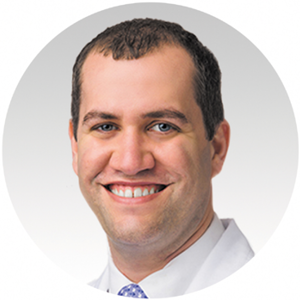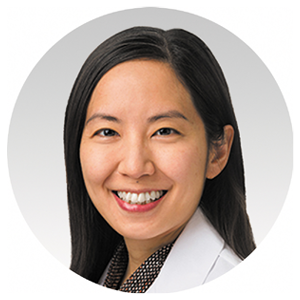Innovation Spotlight: Empowering Feinberg's Unsung Heroes
This story was published in the September 2023 issue of The Philanthropist, a newsletter for supporters and friends of Northwestern University Feinberg School of Medicine.
Each day, our faculty, students, and trainees at Feinberg dedicate time to innovate new ideas and programs that will move the needle in medicine and science. Here, we spotlight some of the exciting work that often happens behind the scenes and beyond daily clinical care.
Thank you to all of the donors who contribute to these efforts, now and in the future. Your philanthropy fuels these projects and programs—enabling their very existence and empowering them to grow for the benefit of patients today and tomorrow.
 Advancing Clinical Trials in Gynecologic Cancer
Advancing Clinical Trials in Gynecologic Cancer
Dario Roque, MD, is a gynecologic oncologist with extensive experience in the clinical management of patients with gynecological malignancies. He is an associate professor of Obstetrics and Gynecology in the Division of Gynecologic Oncology. Dr. Roque has conducted research focusing on the correlation between obesity and endometrial cancer and is currently the principal investigator for a research project aimed at understanding the effects of cisplatin-based Heated Intraperitoneal Chemotherapy (HIPEC) on ovarian cancer DNA damage and repair. Understanding the molecular changes that occur in ovarian cancer cells as a result of HIPEC may help identify new treatment strategies that could be used in combination with HIPEC. He is also interested in identifying biomarkers to better predict and provide therapeutic alternatives to patients with platinum-resistant/refractory ovarian cancer who don’t have many therapeutic options. Additionally, Dr. Roque greatly values equitable gynecologic oncology healthcare. He intends to increase outreach strategies and expand the enrollment of racial and ethnic minority groups in clinical trials.
For more information about supporting the efforts above, contact Jordan Sund at 312-503-2706 or jordan.sund@northwestern.edu.
 Pioneering Research in Restorative Hearing
Pioneering Research in Restorative Hearing
Jaime Garcia-Añoveros, PhD, a basic research scientist and professor of Anesthesiology, Neurology, and Neuroscience, is making important headway in hearing loss research. Dr. Garcia-Añoveros’ research focuses on the development, function, and degeneration of sensory receptor cells. His work led to the discovery of pain sensory systems in the cochlea, transduction channels for touch and pain, and degeneration-causing mutations in somatosensory neurons and hair cells. Dr. Garcia-Añoveros has made landmark discoveries pertaining to the way the cochlea generates its two types of inner and outer hair cells—the sound detectors that permit hearing—and how they get innervated, which is essential for communicating the sense of hearing to the brain. His goal for the next decade is to fully uncover how inner and outer hair cells are separately generated and how they are positioned to serve their distinct functions in hearing. This fundamental knowledge will eventually inform the development of regenerative therapies for the restoration of hearing to the deaf.
For more information about supporting the efforts above, contact Mary Kreller at 312-503-0742 or mary.kreller@northwestern.edu.
 Examining the Pain Experience
Examining the Pain Experience
Yvonne C. Lee, MD, MMSc, is the Helen Myers McLoraine Professor of Rheumatology and an associate professor of Medicine, Division of Rheumatology and of Preventive Medicine, Division of Epidemiology. Dr. Lee is the principal investigator of a National Institutes of Health (NIH)-supported research project studying how rheumatoid arthritis leads to changes in central nervous system pathways responsible for sensing, transmitting, and regulating pain. The NIH provided Dr. Lee with the Supplements to Advance Research (STAR) award, which will provide vital additional funding and resources for her research. Dr. Lee is focused on investigating the experience of pain by those with systemic rheumatic conditions and developing effective pain management and prevention strategies. She seeks to characterize the relationship between pain regulation, pain experience, and drug responses in patients through prospective observational studies and clinical trials. Dr. Lee’s goal is to manage and ultimately mitigate the experience of pain for those living with rheumatic conditions.
For more information about supporting the efforts above, contact MaryPat Mauro at 312-503-1090 or marypat.mauro@northwestern.edu.
 Developing a Cell Map of the
Developing a Cell Map of the
Human Lung
Alexander V. Misharin, MD, PhD, is an associate professor of Medicine in the Division of Pulmonary and Critical Care and has recently developed a comprehensive cell map of the human lung. This map is the largest single-cell lung atlas to date and is an important new resource for lung investigators. Using the Human Lung Cell Atlas, Dr. Misharin and collaborators were able to reveal rare cell types within the lung and point out important cellular differences in humans. His investigation of single-cell types identified commonalities among lung fibrosis, cancer, and COVID-19. Dr. Misharin and his team pioneered a new system for lung disease investigation, as researchers will now be able to track and map cell data. The atlas will generate new ways of understanding lung disease and can help highlight potential therapies for managing lung conditions. His goal is to continue constructing reference maps for all human cells. He and his colleagues believe these maps will provide us with better strategies for diagnosing, observing, and treating disease.
For more information about supporting the efforts above, contact David G. McCreery at 312-503-6099 or david.mccreery@northwestern.edu.